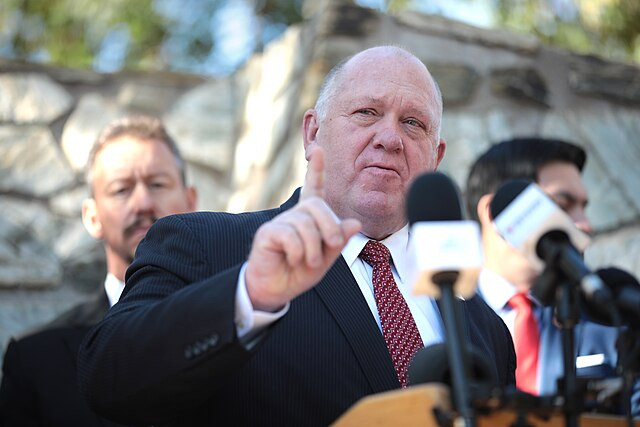Tom Homan, newly appointed as "border czar" by President-elect Donald Trump, has vowed to push forward with an aggressive mass deportation strategy despite facing fierce opposition from some Democratic governors and even receiving death threats. Homan, a former acting director of U.S. Immigration and Customs Enforcement (ICE), declared that states and officials unwilling to cooperate with the new administration's efforts should "get the hell out of the way," he told Fox News Digital.
Homan's appointment underscores Trump's commitment to enforcing stricter immigration policies as he prepares for his second term in the White House. During his first interview since being named border czar, Homan warned that while cooperation with local and state officials is preferable, resistance will not deter the federal government's efforts. "If you don't want to work with us, then get the hell out all the way, we're going to do it," Homan said, emphasizing that ICE is prepared to deploy additional agents to areas of high resistance.
Massachusetts Governor Maura Healey was among those who voiced her opposition to cooperating with Trump's deportation plans, stating last week that her administration would use "every tool in the toolbox" to protect residents and uphold democracy. Homan, however, expressed confidence that certain "sanctuary" jurisdictions may collaborate discreetly, noting that local officials have already reached out privately due to rising crime rates and public safety concerns linked to illegal immigration.
Homan outlined a targeted approach to deportations, focusing primarily on individuals with criminal convictions or pending charges. "It's not going to be a massive sweep of neighborhoods, it's going to be a targeted enforcement operation," he said, adding that anyone residing in the country illegally remains a priority. He stressed the need for consequences in the immigration process to uphold the rule of law and due process.
Beyond political resistance, Homan has faced personal challenges since his appointment. During an appearance on "Fox & Friends," he disclosed that his family has been relocated due to death threats. "They're not going to shut me up. They're not going to make me go away," he said, describing the southern border as the nation's most significant security vulnerability since 9/11. Despite the threats, Homan asserted that the safety of the nation is a nonpartisan issue that must be addressed.
Trump's campaign pledge to enforce stricter border policies resonated strongly with his supporters and was central to his victory over Vice President Kamala Harris. Homan's appointment signifies a determined push to implement those promises, including what is being described as the largest deportation operation in U.S. history. He emphasized the necessity of deporting individuals ordered to leave by federal judges, stating, "You have the right to claim asylum. You have a right to see a judge. We make that happen... But if the judge says you must go home, then we have to take them home."
Homan's stance and rhetoric have drawn criticism from rights groups. Amy Fischer, director of refugee and migrant rights at Amnesty International USA, accused the administration of spreading "harmful lies" about immigrants and fostering xenophobic policies. Fischer argued that such policies are rooted in "racism and xenophobia" and aimed at causing "cruel and immense suffering" to vulnerable communities.
Family separation policies and mass deportation tactics from Trump's first term have resurfaced as key points of concern. When asked during a "60 Minutes" interview about family separation, Homan stated, "Of course there is [a way to deport without separation]. Families can be deported together." However, his words did little to ease tensions among critics who fear a repeat of the practices that drew national outrage during the first Trump administration.
Despite the mounting backlash, Homan remains steadfast in his commitment. "The American people just gave President Trump a mandate," he said. "We're going to secure the border, save lives, and deport people, especially national security threats and public safety threats." His appointment is seen as a pivotal test of the new administration's ability to balance public safety concerns with humanitarian considerations, a challenge that will undoubtedly shape the next four years of immigration policy in the United States.






